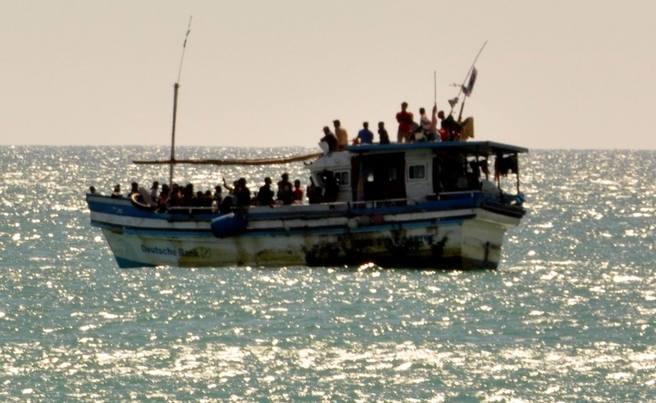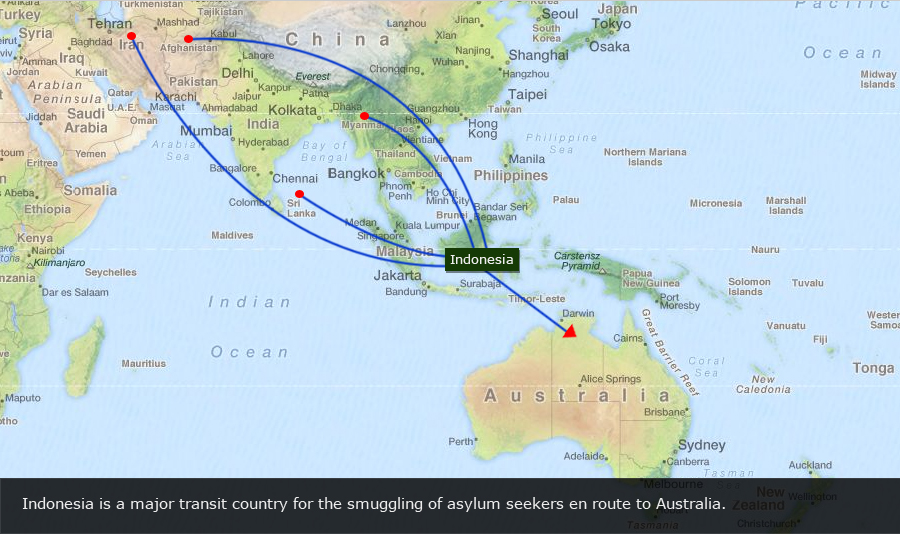
Anti-people smuggling campaigns in Indonesia call asylum seekers “illegal migrants” and equate their transportation with sin.
Since 2009 Australia has funded a series of public information campaigns in Indonesia as part of regional counter-smuggling initiatives. The campaigns are designed to prevent Indonesian fishermen from transporting asylum seekers to Australia. The campaigns are considered a resounding success, according to the agency tasked with their implementation – the International Organisation for Migration (IOM). The IOM claims to have reached more than 30,000 people in fishing communities across the Indonesian archipelago and to have instilled the message amongst them that people smuggling is wrong. After an initial pilot, Australian Customs and Border Protection invested a further $5 million in a second phase of the campaign to run to the end of 2014.
Fishermen from poor coastal villages are frequently recruited by middle-men as crew for boats carrying asylum seekers to Australian territory. As the ‘small-fry’ in the smuggling trade, fishermen are offered what in relative terms is a considerable amount of money for a few days work – enough to clear outstanding debts, to buy much needed fishing equipment, or simply to supplement paltry incomes that are rarely enough to live on. If caught, fishermen like these are regarded as people-smugglers under Australian and Indonesian law. In both countries the minimum sentence for people-smuggling is 5 years in jail. Keeping these ‘small-fry’ out of jail is a laudable aim.
There are good reasons, however, why the apparent “success” of public information campaigns directed towards these fishermen should give us pause for thought.
One of the striking features of the campaign material is the way in which the counter-smuggling message is decontextualized from the broader issues surrounding asylum seekers. The campaigns include short films, produced in collaboration with the Indonesian Police and the Indonesian Department of Immigration. No mention is made of asylum seekers in these films. The people in question are referred to instead as imigran gelap (‘illegal immigrant’) by the Indonesian narrator and as ‘irregular migrant’ in the English subtitles. Nor do the films contain any information as to why these ‘imigran gelap’ have come to Indonesia, what their circumstances might be, or why they would wish to reach Australia.

IOM Indonesia also distributes manuals to Indonesian law enforcement officials outlining their authorities in people-smuggling cases.
Instead, the films focus on three core messages. The first message conveys the fact that transporting illegal immigrants constitutes people-smuggling and is a criminal offense. The second message is that those who engage in people-smuggling harm their reputation and negatively impact their self-esteem (harga diri). The films introduce Indonesian fishermen who have served time in Australian prisons for smuggling offences. The fishermen explain why they regret their actions in an effort to convince the audience that it is better to be a poor but honest fisherman than to profit through crime and end up in jail. The third message is religious – that people-smuggling is a sin (dosa).
In order to give weight to the religious dimension of the message, one of the films includes a Christian pastor and a Muslim cleric having their say. Not only is people-smuggling identified as sinful, but so too is any assistance provided to ‘imigran gelap,’ including accommodation, transport, information or other forms of help. The Christian pastor says, for example: “From a religious perspective it is strictly forbidden to provide assistance or help to those who make journeys without complete documents, those who are also referred to as illegal immigrants (imigran ilegal). …if we provide assistance, we ourselves will be damaged/damned (rugi).”
In addition to the films, special sermon booklets (buku khotbah) have been produced for both Christian and Muslim audiences. The sermons explain why people-smuggling is sinful via biblical analogies and Quranic verses. The IOM specifically targeted religious leaders to cultivate the message in this form. Their authority and influence was intended to ensure the sustainability of the campaign.
When market researchers, contracted by the IOM, initially proposed the idea of sermons, they provided samples for religious leaders to use or adapt. The sample Christian sermon explained why the parable of the good Samaritan should not be interpreted as a justification for assisting ‘imigran gelap’.
An excerpt from the sample Muslim sermon reads as follows: “[Irregular migrants] ask for help but blessed people of Allah, I tell you that this is not the help that is talked about in the Al Qur’an. Bringing irregular migrants to Australia is illegal. And it is a sin. If you agree to help house irregular migrants before they leave for Australia, if you have anything to do with smuggling these irregular migrants to Australia, it is a sin. You are not helping them, you are doing something wrong in the eyes of Allah.”
Using religion as a vehicle to convey political messages is not a new phenomenon in Indonesia. Because of the significant role played by religious scholars there is widespread instrumentalisation of religious networks to promote specific objectives, including for example, the state-driven family planning program ‘two children are enough’ (dua anak cukup).
Nevertheless, religion remains a sometimes volatile influence in Indonesian politics. Any attempt to cultivate religious messages for specific political objectives that derive from interests outside Indonesia (in this case, Australia’s determination to deter asylum seekers) runs the risk of inciting sentiments that may well outrun the original intent of the message. A broader question remains as to whether Australians (Christian, Muslim or otherwise) are happy to have religious messages constructed and deployed in this way as part of Australia’s border policing activities.
Whatever the moral rights and wrongs of assisting asylum seekers, a fisherman’s decision as to whether to crew a boat en route to Australia is likely to be determined moreso by economic concerns than religious ones. Having recently revisited two communities where campaigns had been delivered this point was made clear to us by religious and community leaders, police, intelligence officers and fishermen alike.
Debts, declining fish stock and lack of agricultural alternatives provided good reasons for fishermen and their families to consider people-smuggling as an option for income, despite the legal or religious sanctions involved. Whether or not people-smuggling was illegal, sinful, or reduced self-worth would always play second fiddle to more immediate concerns with putting food on the table.
Against this backdrop, the religious messaging promoted in campaign material reduces the structural and developmental factors shaping fishermens’ choices to matters of individual moral fibre. In the short term, campaigns may alert vulnerable fishing communities to the risks at stake. But because the campaigns obscure the larger issues surrounding asylum seekers they are unlikely to assist fishing communities to fully inform themselves about what is happening, why they are at risk, and what can be done in the longer-term to generate viable alternatives for everyone concerned.
Antje Missbach is a research fellow and Anne McNevin is a lecturer, both are in the School of Social Sciences, Monash University. An extended piece examining Australian-funded campaigns to stop irregular migration is here on Inside Story.
 Facebook
Facebook  Twitter
Twitter  Soundcloud
Soundcloud  Youtube
Youtube  Rss
Rss